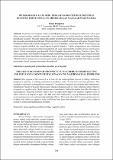| dc.contributor.author | Panjaitan, Binur | |
| dc.date.accessioned | 2018-03-13T08:53:17Z | |
| dc.date.available | 2018-03-13T08:53:17Z | |
| dc.date.issued | 2016-06-01 | |
| dc.identifier.issn | Printed ISSN (p-ISSN): 0216-1370 | |
| dc.identifier.issn | Online ISSN (e-ISSN): 2442-8620 | |
| dc.identifier.uri | http://repository.uhn.ac.id/handle/123456789/404 | |
| dc.description | Penelitian ini bertujuan untuk mendeskripsikan proses metakognisi mahasiswa calon guru
dalam menyelesaikan masalah matematika. Jenis penelitian ini adalah penelitian eksploratif dengan
pendekatan kualitatif. Masalah matematika dalam penelitian ini terdiri atas masalah matematika formal
dan masalah matematika kontekstual. Subjek penelitian ini adalah mahasiswa calon guru Program Studi
Pendidikan Matematika Fakultas Keguruan dan Ilmu Pendidikan Universitas HKBP Nommensen yang
bergaya kognitif reflektif dan yang bergaya kognitif impulsif. Teknik pengumpulan data dilakukan
lewat wawancara mendalam untuk menggali hal-hal yang memengaruhi terjadinya proses metakognisi
subjek. Untuk menentukan gaya kognitif reflektif-impulsif digunakan Matching Familiar Figure Test.
Data yang sudah valid dianalisis dengan memperhatikan bagaimana proses metakognisi subjek terhadap
permasalahan. Hasil penelitian menunjukkan bahwa proses metakognisi subjek yang bergaya kognitif
reflektif berbeda dengan proses metakognisi subjek yang bergaya kognitif impulsif, baik dalam masalah
matematika formal maupun matematika kontekstual. | en_US |
| dc.description.abstract | The purpose of this research is to describe the metacognition process of college students,as
prospective teachers, in solving mathematical problems, either formal and contextual problems. This
research is explorative using qualitative approach. The subject of research was students ofthe Mathematics
Department, Faculty of Teacher Training and Education Nommensen University who have either reflective
or impulsive cognitive style. Depth interviewwas carried out to find outthe factors that affect the subjects’
metacognition. Matching Familiar Figure Test was employed to figure out students’ cognitive style of
either reflective or impulsive type. The data were then analyzed by paying attention at the subjects’
metacognition process in solving mathematical problems. The results show that the metacognition process
of those with reflective cognitive style is different from those with impulsive cognitive style, either in
formal or contextual mathematical problem. | en_US |
| dc.description.sponsorship | Lembaga Penelitian dan Pengabdian Masyarakat Universitas HKBP Nommensen | en_US |
| dc.language.iso | other | en_US |
| dc.publisher | Jurnal Cakrawala Pendidikan Universitas Negeri Yogyakarta | en_US |
| dc.relation.ispartofseries | TH XXXV;Nomor 2 | |
| dc.subject | Metakognisi | en_US |
| dc.subject | Pemecahan Masalah | en_US |
| dc.subject | Gaya Kognitif | en_US |
| dc.title | METAKOGNISI CALON GURU BERGAYA KOGNITIF REFLEKTIF DAN KOGNITIF IMPULSIF DALAM MEMECAHKAN MASALAH MATEMATIKA | en_US |
| dc.title.alternative | THE METACOGNITIONOF PROSPECTIVE TEACHERS WITH REFLECTIVE AND IMPULSIVE COGNITIVESTYLEIN SOLVING MATHEMATICAL PROBLEMS | en_US |
| dc.type | Article | en_US |

